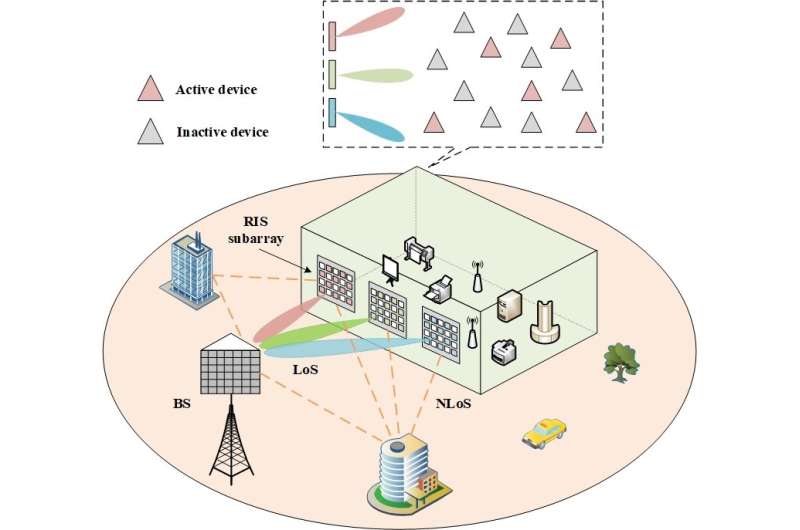Boosting access reliability in wireless communications

With the emerging Internet-of-Things that holds promise for operating everything from smart homes to smart cities, fifth-generation wireless communication must be able to handle the demands for low delay and high reliability. To meet these demands, researchers propose the use of reconfigurable intelligent surface technology for grant-free massive access to boost the reliability of access in wireless communication.
The team, led by researchers from Beijing Institute of Technology, published their findings in the journal Intelligent and Converged Networks.
Massive machine-type communications (mMTC) is vital to fifth-generation (5G) wireless communication. In mMTC, the communication between machines over wired and wireless networks takes place with little or no intervention from humans. The emerging Internet-of-Things requires this kind of communication with minimal delay and high reliability. In the Internet of Things, machines, sensors, and robots have to be connected to run technologies ranging from smart home security systems to wearable health monitors to wireless inventory trackers to biometric cybersecurity scanners.
To meet the demands of the Internet of Things applications demanding low latency and high reliability, grant-free random access has been proposed as a promising enabler that can simplify the connection procedures and significantly reduce access delays. With grant-free random access, channel resources can be accessed without undergoing a handshake process.
The research team is exploring the reconfigurable intelligent surface (RIS) as a possible solution to these demands. An RIS is a programmable structure where the electric and magnetic properties of the surface can be changed. "We propose to leverage the burgeoning reconfigurable intelligent surface for grant-free massive access working at millimeter-wave frequency to further boost access reliability," said Xingyu Zhou, lead study author from the Advanced Research Institute of Multidisciplinary Sciences, Beijing Institute of Technology.
Scientists have viewed RIS as an enabling technology for next generation wireless communication networks because of its ability to substantially improve the link quality and the coverage range. An RIS consists of numerous programmable passive elements with ultra-low power consumption and low hardware costs. The RIS can reconfigure the propagation of incident electromagnetic waves by attaching phase shifts that can be controlled independently controllable for each element.
The team studied a scenario that involved a cluster of RIS subarrays operating in reflection mode to assist the grant-free massive access in a smart factory. The RIS subarrays offer an additional degree of freedom and the appropriate refraction matrices design. In the grant-free access models, the most challenging problems are active device detection (ADD) and channel estimation (CE), called joint-ADDCE or JADDCE. By using theoretical derivation, where the scientists draw conclusions from other known assumptions, the team was able to show that the challenging JADDCE problem in this context has the same mathematical form as the traditional grant-free massive access. So they used the efficient approximate message passing (AMP) algorithm, to overcome the JADDCE challenges. Finally, to demonstrate the effectiveness and superiority of their proposed scheme, the team carried out numerical simulations to compare their scheme with the state-of-the-art solutions. Their scheme improved the access channel conditions and enhanced the quality of access services in the smart factory scenario.
Looking ahead the team members see the potential for wide-ranging applications. "Our proposed scheme can be widely used in the future Internet of Things network, such as in smart factories or smart cities, to enhance the efficiency of massive access," Zhou said. "In future work, we will further exploit the powerful AI tool to implement signal processing more efficiently. Meanwhile, we will evaluate the effectiveness of our proposed scheme from more dimensions and indicators."
More information: Xingyu Zhou et al, Reconfigurable intelligent surface assisted grant-free massive access, Intelligent and Converged Networks (2022). DOI: 10.23919/ICN.2022.0009





















